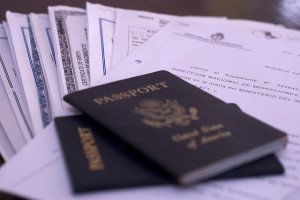990,553 persons became Lawful Permanent Residents (LPR) of the United States. This is a decrease from 2011 and 2012.
66% of these new LPRs received their status through a family member who is a US citizen or LPR.
New LPRs: Mexico (13.6%), China (7.2%), India (6.9%), Philippines (5.5%).
The Diversity Visa
Every year, 50,000 diversity visas are issued for natives of countries that have historically low rates of immigration to the US. The lottery is free and the season kicks off October 1. Natives of the following countries are barred because over 50,000 natives from those countries have immigrated to the US in the previous five years:
Bangladesh, Brazil, Canada, China (mainland), Colombia, Dominican Republic, Ecuador, El Salvador, Haiti, India, Jamaica, Mexico, Nigeria, Pakistan, Peru, Philippines, South Korea, United Kingdom, Vietnam
New Lawful Permanent Residents by State 2013
California: 191,806 (19.4%), New York: 133,601 (13.5%), Florida: 102,939 (10.4%), Texas: 92,674 (9.4%), New Jersey: 53, 082 (5.4%). Pennsylvania is number 10 with 24,720 (2.5%).
52% female and 48% male.
Over 58% LPRs are married.
New York City-Northern New Jersey-Long Island more than doubled the second metropolitan finisher (Los Angeles-Long Beach-Santa Ann) in most number of LPRs.

